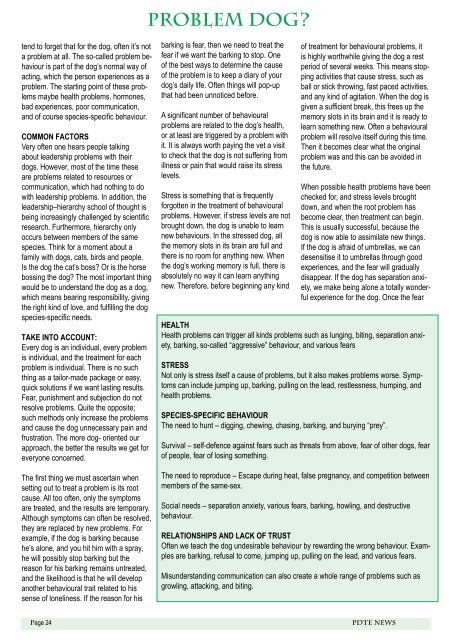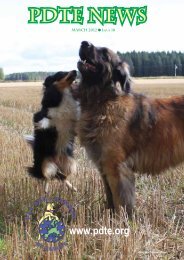PDTE 2012 October Newsletter
Create successful ePaper yourself
Turn your PDF publications into a flip-book with our unique Google optimized e-Paper software.
Problem dog?<br />
tend to forget that for the dog, often it’s not<br />
a problem at all. The so-called problem behaviour<br />
is part of the dog’s normal way of<br />
acting, which the person experiences as a<br />
problem. The starting point of these problems<br />
maybe health problems, hormones,<br />
bad experiences, poor communication,<br />
and of course species-specific behaviour.<br />
Common factors<br />
Very often one hears people talking<br />
about leadership problems with their<br />
dogs. However, most of the time these<br />
are problems related to resources or<br />
communication, which had nothing to do<br />
with leadership problems. In addition, the<br />
leadership–hierarchy school of thought is<br />
being increasingly challenged by scientific<br />
research. Furthermore, hierarchy only<br />
occurs between members of the same<br />
species. Think for a moment about a<br />
family with dogs, cats, birds and people.<br />
Is the dog the cat’s boss? Or is the horse<br />
bossing the dog? The most important thing<br />
would be to understand the dog as a dog,<br />
which means bearing responsibility, giving<br />
the right kind of love, and fulfilling the dog<br />
species-specific needs.<br />
Take into account:<br />
Every dog is an individual, every problem<br />
is individual, and the treatment for each<br />
problem is individual. There is no such<br />
thing as a tailor-made package or easy,<br />
quick solutions if we want lasting results.<br />
Fear, punishment and subjection do not<br />
resolve problems. Quite the opposite;<br />
such methods only increase the problems<br />
and cause the dog unnecessary pain and<br />
frustration. The more dog- oriented our<br />
approach, the better the results we get for<br />
everyone concerned.<br />
The first thing we must ascertain when<br />
setting out to treat a problem is its root<br />
cause. All too often, only the symptoms<br />
are treated, and the results are temporary.<br />
Although symptoms can often be resolved,<br />
they are replaced by new problems. For<br />
example, if the dog is barking because<br />
he’s alone, and you hit him with a spray,<br />
he will possibly stop barking but the<br />
reason for his barking remains untreated,<br />
and the likelihood is that he will develop<br />
another behavioural trait related to his<br />
sense of loneliness. If the reason for his<br />
barking is fear, then we need to treat the<br />
fear if we want the barking to stop. One<br />
of the best ways to determine the cause<br />
of the problem is to keep a diary of your<br />
dog’s daily life. Often things will pop-up<br />
that had been unnoticed before.<br />
A significant number of behavioural<br />
problems are related to the dog’s health,<br />
or at least are triggered by a problem with<br />
it. It is always worth paying the vet a visit<br />
to check that the dog is not suffering from<br />
illness or pain that would raise its stress<br />
levels.<br />
Stress is something that is frequently<br />
forgotten in the treatment of behavioural<br />
problems. However, if stress levels are not<br />
brought down, the dog is unable to learn<br />
new behaviours. In the stressed dog, all<br />
the memory slots in its brain are full and<br />
there is no room for anything new. When<br />
the dog’s working memory is full, there is<br />
absolutely no way it can learn anything<br />
new. Therefore, before beginning any kind<br />
of treatment for behavioural problems, it<br />
is highly worthwhile giving the dog a rest<br />
period of several weeks. This means stopping<br />
activities that cause stress, such as<br />
ball or stick throwing, fast paced activities,<br />
and any kind of agitation. When the dog is<br />
given a sufficient break, this frees up the<br />
memory slots in its brain and it is ready to<br />
learn something new. Often a behavioural<br />
problem will resolve itself during this time.<br />
Then it becomes clear what the original<br />
problem was and this can be avoided in<br />
the future.<br />
When possible health problems have been<br />
checked for, and stress levels brought<br />
down, and when the root problem has<br />
become clear, then treatment can begin.<br />
This is usually successful, because the<br />
dog is now able to assimilate new things.<br />
If the dog is afraid of umbrellas, we can<br />
desensitise it to umbrellas through good<br />
experiences, and the fear will gradually<br />
disappear. If the dog has separation anxiety,<br />
we make being alone a totally wonderful<br />
experience for the dog. Once the fear<br />
Health<br />
Health problems can trigger all kinds problems such as lunging, biting, separation anxiety,<br />
barking, so-called “aggressive” behaviour, and various fears<br />
Stress<br />
Not only is stress itself a cause of problems, but it also makes problems worse. Symptoms<br />
can include jumping up, barking, pulling on the lead, restlessness, humping, and<br />
health problems.<br />
Species-specific behaviour<br />
The need to hunt – digging, chewing, chasing, barking, and burying “prey”.<br />
Survival – self-defence against fears such as threats from above, fear of other dogs, fear<br />
of people, fear of losing something.<br />
The need to reproduce – Escape during heat, false pregnancy, and competition between<br />
members of the same-sex.<br />
Social needs – separation anxiety, various fears, barking, howling, and destructive<br />
behaviour.<br />
Relationships and lack of trust<br />
Often we teach the dog undesirable behaviour by rewarding the wrong behaviour. Examples<br />
are barking, refusal to come, jumping up, pulling on the lead, and various fears.<br />
Misunderstanding communication can also create a whole range of problems such as<br />
growling, attacking, and biting.<br />
Page 24 <strong>PDTE</strong> NEWS

















